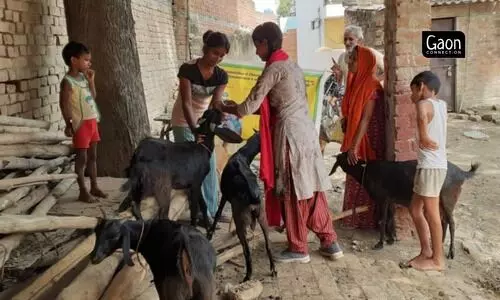Baburi, Barabanki, Uttar Pradesh
Once a week, Nisha packs up her medicine kit, and sets off on her rounds from her home. The 20-year-old in a grey salwar kameez with a dupatta over her shoulders and a long braid hanging down her back, driving off on the muddy lanes on a scooty is a familiar sight for the inhabitants of Baburi village in Barabanki district, Uttar Pradesh.
Nisha is an Artificial Insemination (AI) technician, besides being a Pashu Sakhi or a livestock nurse. Artificial Insemination is a technique that allows dairy goat breeders the flexibility to increase the rate of genetic improvement in their herds.
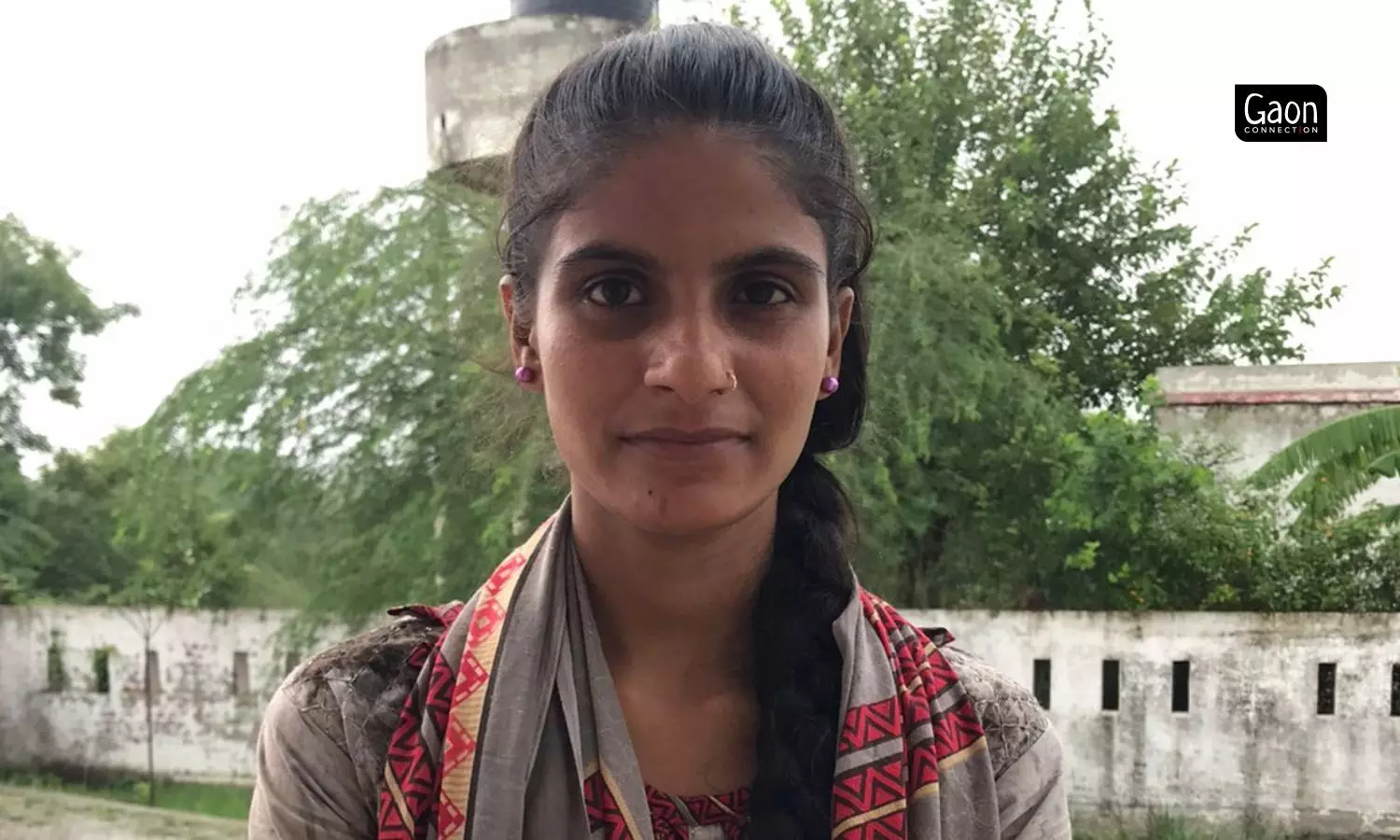
Nisha, a 20-year-old in a grey salwar kameez is an Artificial Insemination (AI) technician, besides being a Pashu Sakhi.
“I check the goats in my villages and other villages nearby once a week. I am also doing my Bachelors at the Mahila Degree College at Barabanki,” Nisha told Gaon Connection.
Also Read: Goat farming supports livelihoods in Rajasthan where agriculture is practically impossible
It was in 2020 that Nisha became a Pashu Sakhi. A Lucknow-based non-profit The Goat Trust, which works across the value chain of goat based products and aims to generate employment among rural women, trained her and other women to be pashu sakhis. Nisha’s mother Sarita was also one of them. Now both mother-daughter duo work as Pashu Sakhis.
The Goat Trust has trained for free over 25,000 rural women as Pashu Sakhi. It also works with approximately 450,000 goat farmers across 18 states including Uttar Pradesh, Bihar, Jharkhand, Tripura, Orissa and Maharashtra. In Uttar Pradesh, there is one Pashu Sakhi each in 250 villages in Sitapur, Barabanki and Lucknow districts of the state.
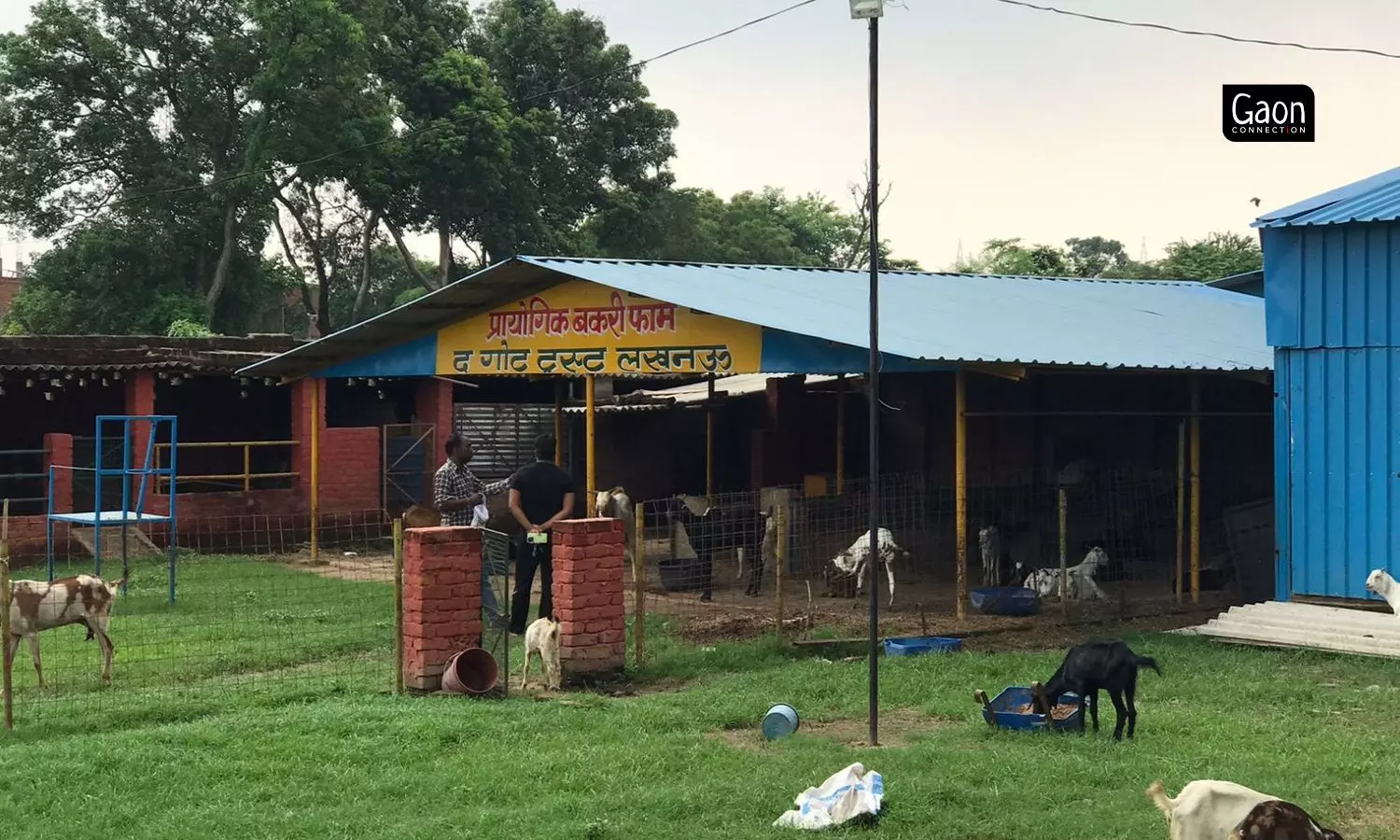
The Goat Trust works across the value chain of goat based products and aims to generate employment among rural women.
“We have trained approximately 250 Pashu Sakhis in Uttar Pradesh. We teach them the goat rearing techniques, introduce them to breed improvement programmes, and artificial insemination. We also teach them community and capacity building,” Ashish Kumar, Director (Technology and Research), The Goat Trust, in Rasoolpur Sadat village in Lucknow, told Gaon Connection.
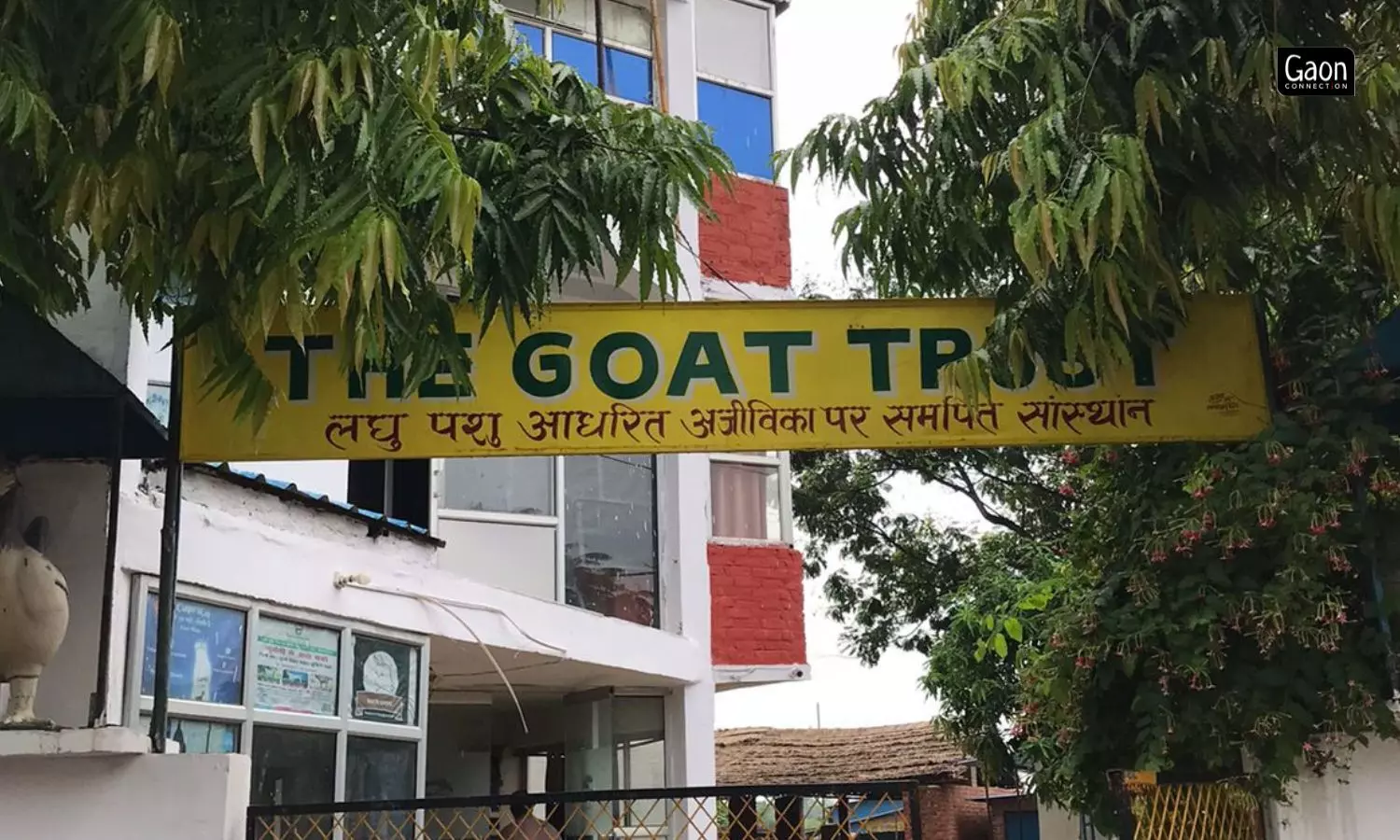
The Goat Trust has trained for free over 25,000 rural women as Pashu Sakhi. It also works with approximately 450,000 goat farmers across 18 states.
“Our trust has been working for the upliftment and empowerment of rural women so that they take lead in goat health and productivity enhancement,” he added.
Training of Pashu Sakhi
The Pashu Sakhi training was for a week where Nisha, her 50-year-old mother Sarita and other women were taught essential techniques like goat rearing, breeding, deworming, and vaccination. After its completion, Nisha went on to do an additional six-month training in artificial insemination. This training was also offered free of cost by The Goat Trust.
Together the mother and daughter offer a range of services, including deworming (Rs 5), vaccination (Rs 5), artificial insemination (Rs 30). They also prepare the concentrated and nutritious feed (Rs 2 per kg) and make mineral bricks for the goat to lick (Rs 3 per brick) so that the kids of the goats grow up healthy and also fetch a good price.
Sarita and Nisha earn up to Rs 2000 a month each for the hard work that they do every day.
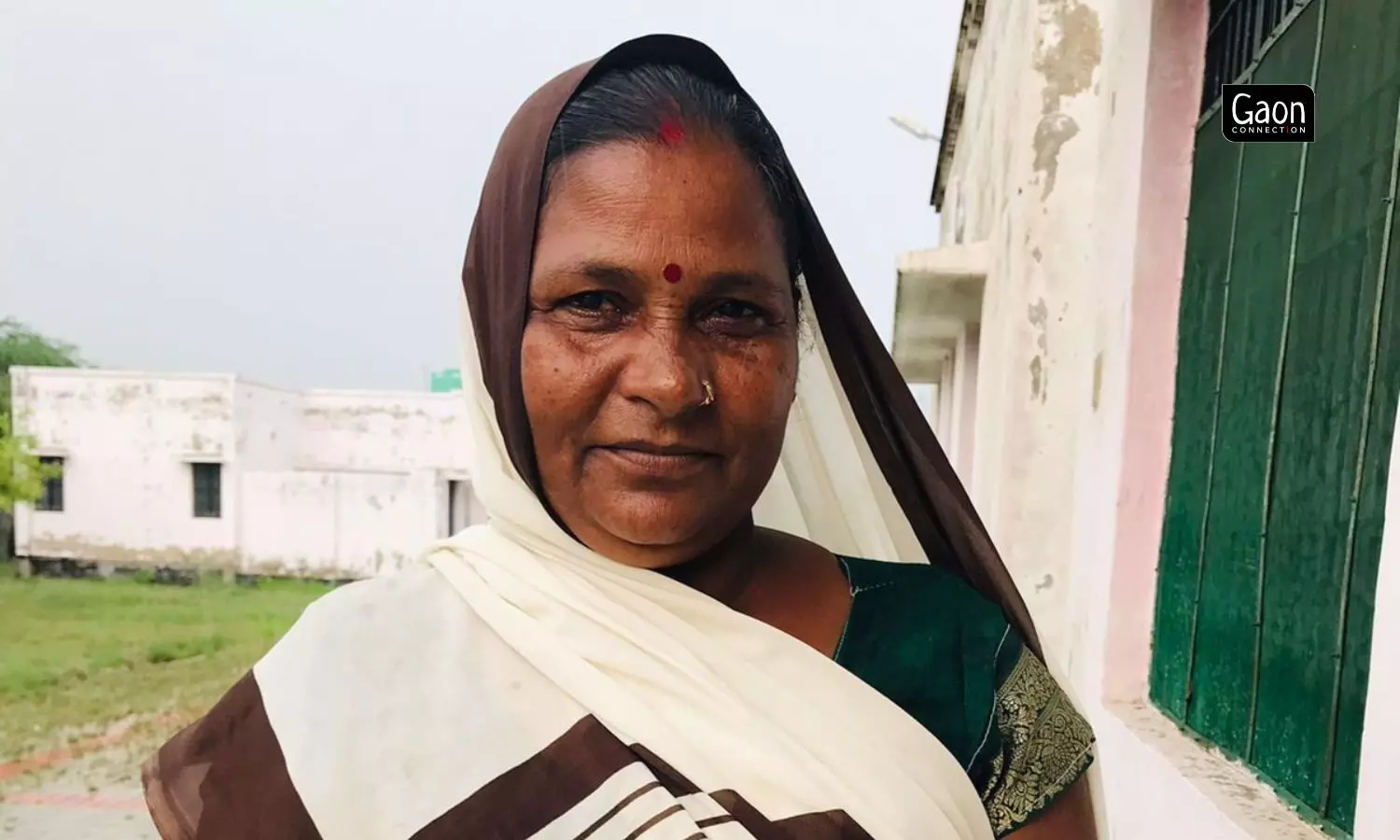
The 50-year-old Sarita, mother of Nisha were taught essential techniques like goat rearing, breeding & deworming.
“It is not much but it gives us financial autonomy and a feeling of satisfaction,” said Nisha.
“As a Pashu Sakhi I have trained many women. I have also spread awareness amongst the villagers about the proper way to look after their goats,” Sarita told Gaon Connection. “I have worked with 55 goat farmers and have treated 600 goats in and around my village,” she added.
The mother and daughter also make milk replacer (artificial milk made by replacing milk protein with non milk protein based on the nutritional standards of breast milk), oil, chyawanprash (immunity booster) and fodder for goats, so that they remain healthy. “This also brings us an added income of about Rs 500 a month,” said Sarita.
In India, livestock rearing in rural areas is the principal source of livelihood for approximately 3.7 per cent of the agricultural families as per the 2019 census.
The Pashu Sakhi programme is seen as prudent to provide last minute services like treating the sick goats, helps in generating additional source of income among rural households and empowering rural women like Nisha and her mother.
Also Read: A mobile app provides rural women a platform to buy and sell livestock
Mother-daughter bonding
For Nisha, working with her mother has been a boon, she said. “She has been there for me like a rock in every situation, good or bad,” said Nisha.
The mother and daughter had to face a lot of unkind remarks from relatives and neighbours when they began working outdoors. It is just not something women in conservative villages do. But, they went ahead nevertheless.
“I am happy that nothing stopped us and we were firm on our decision. My struggle for independence and the journey to become a Pashu Sakhi was consistent. I never bothered about what others said. At the end of the day, they won’t pay my bills. And, my mother and I decided we would do something to improve our financial condition and help out my father who is a farmer,” said Nisha.
The most exciting thing for her is the fact that she has been able to buy herself a scooty with the money she earned and saved. “My mother initially thought that money should be saved for my trousseau and we argued about that,” laughed Nisha.
Also Read: Goats milk grows in demand offering breeders better profits
But Sarita capitulated and Nisha is now the proud owner of her own vehicle. “That moment when I bought the scooty for myself with my hard earned money, was priceless,” she said.
Meanwhile, when Nisha became an AI technician and started earning well, people began to look at her with respect. As an AI technician, she earns Rs 80 per goat she treats.
“My neighbours and relatives have finally started respecting me for the work I chose to do. Now they call me ‘doctor didi,’” she said.

